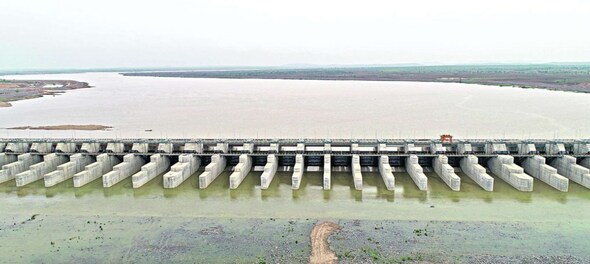
The Kaleshwaram Lift Irrigation Project (KLIP), a multi-purpose irrigation project and the pet project of the (Bharat Rashtra Samithi) BRS and former Telangana CM K. Chandrashekhar Rao, is now likely to exceed ₹1.47 lakh crore, as opposed to the previous estimated cost of ₹81,000 crore, according to the report of the Comptroller and Auditor General of India (CAG).
The report, titled 'Performance Audit on Kaleshwaram Project,' was tabled in the Telangana legislative assembly on Thursday.
According to the report, the Telangana government has not given administrative approval for the project as a whole, issuing instead 73 separate approvals totalling ₹1.1 lakh crore. Furthermore, there are no government orders regarding the funding pattern for the project.
The report goes on to state that out of the total expenditure of ₹86,788.06 crore incurred on the project as of March 2022, 64.3%, i.e., ₹55,807.86 crore, was met from off-budget borrowings raised by the Kaleshwaram Irrigation Project Corporation Limited (KIPCL), a special purpose vehicle set up by the BRS government to handle finances related to the Kaleshwaram project.
The project cost was understated in the Detailed Project Report (DPR) due to estimates being prepared at old price levels and the non-inclusion of provisions for price escalation.
Coupled with subsequent changes made in the project works, this resulted in the cost of works increasing from ₹63,352 crore to ₹1.02 lakh crore. During re-engineering, the Kaleshwaram and Pranahitha Projects together were estimated to cost ₹85,651.81 crore, as against the project cost of ₹38,500 crore of the earlier PCSS Project.
While the combined project cost increased by 122%, the targeted CA increased by only 52.22%. Even after the initial re-engineering, further additions and changes were made in the scope of Kaleshwaram Project works, taking the present likely project cost to ₹1,47,427.41 crore (including interest during construction), while there is no further increase in the envisaged benefits.
Thus, the combined project cost of the two projects now stands at ₹1,51,168.21 crore. This may increase further as the DPR of the Pranahitha Project is not yet prepared (March 2022), and its cost is yet to be worked out, the report said.
The CAG report outlined that the possibility of undue benefit of at least ₹2,684.73 crore to the contractors of these works cannot be ruled out.
"The Department showed undue haste in the award of works. Seventeen works costing ₹25,049.99 crore were awarded even before the approval of the DPR. Out of the 56 project works, only 12 works were completed, 40 works were ongoing, while 4 works have not even commenced, as of March 2022. Lands required for the distributary network, etc., are yet to be fully identified. Further, the post-tender inclusion of the price adjustment clause resulted in an avoidable payment of ₹1,342.48 crore," the report reads.
WHAT ARE THE MAIN OBSERVATIONS OF THE CAG REPORT?
On June 21, 2019, the project was opened by Telangana Governor Narasimhan and then Chief Ministers K. Chandrashekar Rao of Telangana, Devendra Fadnavis of Maharashtra, and Y.S. Jaganmohan Reddy of Andhra Pradesh.
While BRS defended the project, the Opposition, including Congress and the BJP, accused the Rao government of shoddy management. The Telangana Congress in its election manifesto also promised a judicial inquiry into alleged irregularities and corruption surrounding the construction of the project and since coming to power has been heavily critical of it.
(Edited by : Anand Singha)
Check out our in-depth Market Coverage, Business News & get real-time Stock Market Updates on CNBC-TV18. Also, Watch our channels CNBC-TV18, CNBC Awaaz and CNBC Bajar Live on-the-go!


Supreme Court says it may consider interim bail for Arvind Kejriwal due to ongoing Lok Sabha polls
May 3, 2024 4:57 PM
10% discount on fare on Mumbai Metro lines 2 and 7A on May 20
May 3, 2024 2:40 PM

